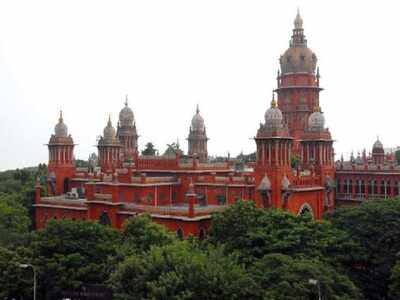
MADURAI: Are Pali, Prakrit, Arabic and Persian classical languages? Have they been declared so? If declared, on what basis have they been referred to as classical languages? Bombarding the central government with these questions, the Madras high court has given the Centre time till October 28 to submit a report answering the queries.
The court has also sought to know as to who was the official responsible for issuing a notification leaving out post-graduation in Tamil as qualification to apply for the PG Diploma course on archaeology at Pt Deendayal Upadhyaya Institute of Archaeology of ASI at Noida.
Refusing to believe that it was an inadvertent error, and suspecting that it was a deliberate act, a division bench of Justice N Kirubakaran and Justice B Pugalendhi directed the central government to submit a report identifying the erring official who had issued the notification and explaining as to what action is to be taken against the officer.
The issue relates to the admission notification inviting online application for the diploma course saying persons with a master's degree in ancient or medieval Indian history/ archaeology/ Indian classical languages such as Sanskrit, Pali, Prakrit, Arabic or Persian were eligible to apply for the course. After the notification triggered an uproar, amendments have been issued making masters degree in any notified classical language would be qualification for applying for the course.
The present petition was filed by advocate S Ramesh Kumar of Sivaganga district for a direction to include PG in Tamil as a qualification. In response, assistant solicitor-general L Victoria Gowri said the institute issued a corrigendum on October 8 stating that masters in all classical languages notified by the central government such as Tamil, Sanskrit, Kannada, Telugu, Malayalam, Odia, and Pali, Prakrit, Arabic, among others, are eligible for applying to the course.
The judges, reiterating their earlier concern that unless authorities are cautious while dealing with the language issues, voices of chauvinistic elements would be strengthened, said the notification fiasco showed the incompetence of the official who did it without any knowledge of Indian classical languages.
The judges pointed out that only after voices were raised and after the petition was filed highlighting omission of classical languages, a corrigendum was issued. They, however, observed that the government could not be faulted for the mistake of one or two officials.
The court has also sought to know as to who was the official responsible for issuing a notification leaving out post-graduation in Tamil as qualification to apply for the PG Diploma course on archaeology at Pt Deendayal Upadhyaya Institute of Archaeology of ASI at Noida.
Refusing to believe that it was an inadvertent error, and suspecting that it was a deliberate act, a division bench of Justice N Kirubakaran and Justice B Pugalendhi directed the central government to submit a report identifying the erring official who had issued the notification and explaining as to what action is to be taken against the officer.
The issue relates to the admission notification inviting online application for the diploma course saying persons with a master's degree in ancient or medieval Indian history/ archaeology/ Indian classical languages such as Sanskrit, Pali, Prakrit, Arabic or Persian were eligible to apply for the course. After the notification triggered an uproar, amendments have been issued making masters degree in any notified classical language would be qualification for applying for the course.
The present petition was filed by advocate S Ramesh Kumar of Sivaganga district for a direction to include PG in Tamil as a qualification. In response, assistant solicitor-general L Victoria Gowri said the institute issued a corrigendum on October 8 stating that masters in all classical languages notified by the central government such as Tamil, Sanskrit, Kannada, Telugu, Malayalam, Odia, and Pali, Prakrit, Arabic, among others, are eligible for applying to the course.
The judges, reiterating their earlier concern that unless authorities are cautious while dealing with the language issues, voices of chauvinistic elements would be strengthened, said the notification fiasco showed the incompetence of the official who did it without any knowledge of Indian classical languages.
The judges pointed out that only after voices were raised and after the petition was filed highlighting omission of classical languages, a corrigendum was issued. They, however, observed that the government could not be faulted for the mistake of one or two officials.

Coronavirus outbreak
Trending Topics
LATEST VIDEOS
City
 HAL employee arrested for supplying fighter jet information to Pakistan
HAL employee arrested for supplying fighter jet information to Pakistan  Shocking: BJP MLA's relative shot dead during morning walk in Ghaziabad
Shocking: BJP MLA's relative shot dead during morning walk in Ghaziabad  Fodder scam: Former Bihar CM Lalu Prasad Yadav gets bail in Chaibasa treasury case, to remain in jail
Fodder scam: Former Bihar CM Lalu Prasad Yadav gets bail in Chaibasa treasury case, to remain in jail  Shocking: 50-year-old temple priest set on fire in Rajasthan's Karauli
Shocking: 50-year-old temple priest set on fire in Rajasthan's Karauli
More from TOI
Navbharat Times
Featured Today in Travel
Quick Links
Delhi Air PollutionHaryana Coronavirus Helpline NumberUP Coronavirus Helpline NumberBangalore TemperatureBhopal NewsCoronavirus in DelhiCoronavirus in HyderabadHyderabad RainCoronavirus symptomsCoronavirusDelhi TemperatureAditya ThackerayShiv SenaFire in MumbaiMumbai RainsArvind KejriwalBangalore FloodsSrinagar encounter
Get the app



